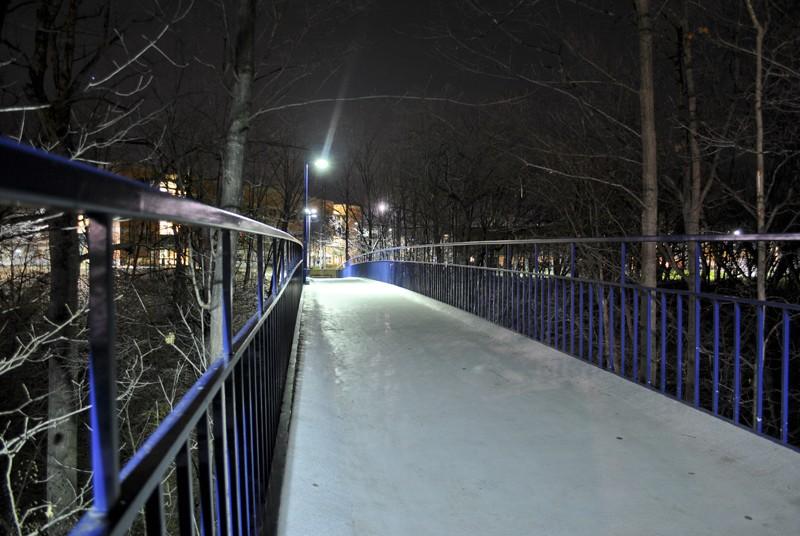‘This really is an exception’

GVL/ Allison Young
Dec 1, 2011
During a two-week span last month, two Grand Valley State University students reported two separate attempted assaults near the Allendale Campus’ Little Mac Bridge.
Following both reports, the Grand Valley Police Department sent out campus-wide emails about the incidents as mandated under the federal ordinances of the Clery Act, which requires university police to notify the student body if they believe there may be an ongoing threat to the community.
Both reports were eventually recanted, and the students who reported them told police they had made up their respective incidents. GVPD again notified the public, through another campus-wide email, that the statements had been recanted.
Capt. Brandon DeHaan, assistant director of GVPD, said the university is currently reviewing the cases to determine a course of action. In cases of false allegations, students may be referred to the Dean’s Office to resolve the issue through the academic judiciary process, potentially face criminal charges, or both.
In each of the two separate incidents, the female students told GVPD they were walking by the Little Mac Bridge late at night when unidentified male suspects assaulted them.
In the first report, the female said the suspect grabbed her and refused to let go when a third male student riding a bicycle stopped to intervene. During the investigation, she changed details in her story and eventually recanted.
The second student who came forward recanted her report of sexual assault, reported to GVPD on Nov. 17, shortly after the initial statement was made.
In both cases, DeHaan said police became suspicious upon launching the investigations when evidence did not match up with the victims’ stories. Police still continued the investigations until the students recanted their statements.
Patti Haist, director of Clinical Services at YWCA West Michigan and member of the Campus Violence Prevention Team, a community effort between GVSU and surrounding organizations, said it’s extremely hard to speculate why a person might report a false allegation since every case has so many different variables.
She added that in her own experiences at YWCA, there are a lot of different situations that might lead to false allegations, ranging anywhere from some individuals feeling like they have to report exaggerated stories in order to be taken seriously to an individual who might be facing past trauma in regards to prior sexual assault or sexual abuse when they were child.
“We’ve had situations where people have told stories that weren’t exactly what happened to them because they were getting home late and they needed some kind of cover story – you know, those kinds of situations,” she said. “You know, I think it’s likely that clearly there are issues that they’re struggling with, and I’d hate for other students to be making harsh judgment against that person.”
She said although false allegations do happen, the YWCA always initially believe that it’s likely something may have happened to the individual and that in the grand scheme of things, false reports are the exception.
“I hope that the reporting can indicate that this really is an exception that so many sexual assaults are never reported,” Haist said. “I think people hear about one or two false reports and then they think every rape they hear about is a false report and that is the thing we don’t want to see happen.”
Women’s Center Director Marlene Kowalski Braun said false allegations on college campuses are no more common than any other crime, and GVSU’s numbers are generally in line with national statistics.
“Our sense is from research and then general research, that incidents of sexual assault false allegations are no different than other crimes — that they’re parallel or within the same sort of range,” she said.
Those statistics, published by Violence Against Women in 2010, found that out of 136 sexual assaults reported to a major Northeastern university over a 10-year period, only eight proved to be false allegations.
“So it’s really, really low,” said Theresa Rowland, coordinator of the Women’s Center’s Violence Against Women grant. “It’s right in alignment with the national statistics of two in 10 percent, so really minimal.”
In the recent myGVSU campus climate survey, 154 students reported that they had been sexually assaulted while at GVSU. Most of the reported victims were undergraduate women who said the assault took place during the first six weeks of their first semester. Most of the respondents indicated the incidents went unreported.
DeHaan, Kowalski Braun and Rowland each said the circumstance surrounding the recent false allegations should not deter any student from reporting an assault or attempted assault.
“What I think the stories about false allegations have done is they’ve increased the conversation and in increasing the conversation, we have come to understand even more, the prevalence of victimization,” Kowalski Braun said.






















